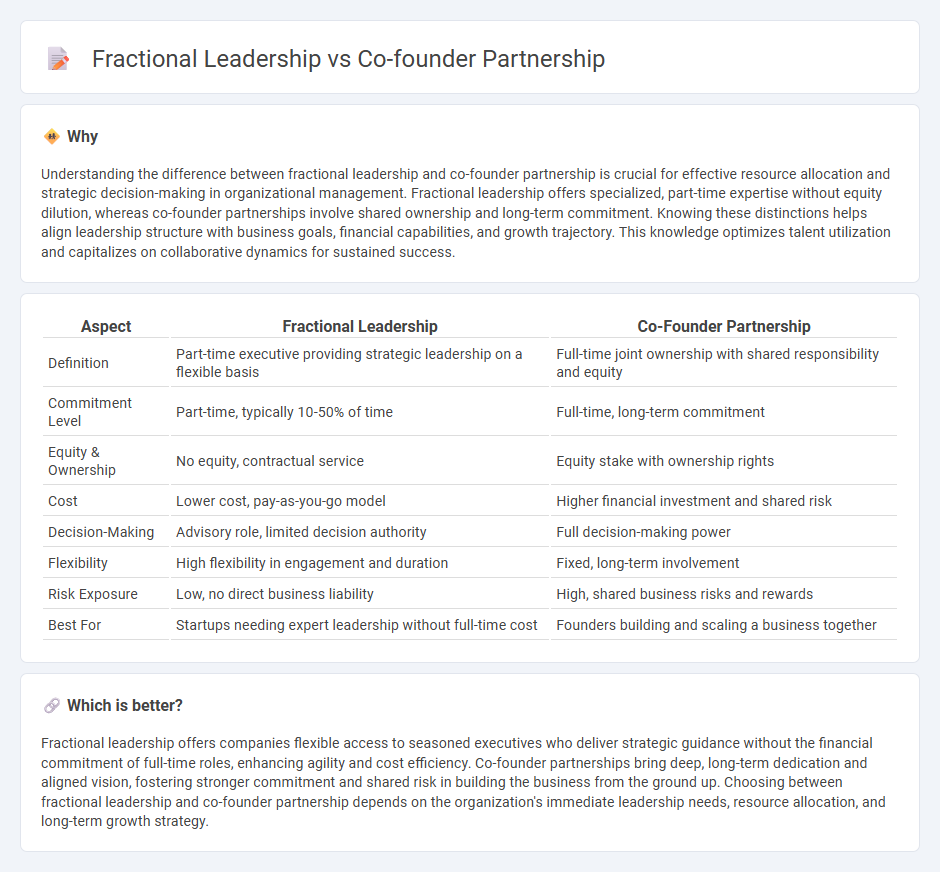
Fractional leadership offers specialized executive expertise on a part-time basis, providing agile and cost-effective management without the long-term commitment of full-time roles. Co-founder partnerships involve shared ownership and responsibility from inception, aligning vision and capital but requiring deeper collaboration and risk-sharing. Discover the key advantages and decision factors between these strategic leadership models.
Why it is important
Understanding the difference between fractional leadership and co-founder partnership is crucial for effective resource allocation and strategic decision-making in organizational management. Fractional leadership offers specialized, part-time expertise without equity dilution, whereas co-founder partnerships involve shared ownership and long-term commitment. Knowing these distinctions helps align leadership structure with business goals, financial capabilities, and growth trajectory. This knowledge optimizes talent utilization and capitalizes on collaborative dynamics for sustained success.
Comparison Table
| Aspect | Fractional Leadership | Co-Founder Partnership |
|---|---|---|
| Definition | Part-time executive providing strategic leadership on a flexible basis | Full-time joint ownership with shared responsibility and equity |
| Commitment Level | Part-time, typically 10-50% of time | Full-time, long-term commitment |
| Equity & Ownership | No equity, contractual service | Equity stake with ownership rights |
| Cost | Lower cost, pay-as-you-go model | Higher financial investment and shared risk |
| Decision-Making | Advisory role, limited decision authority | Full decision-making power |
| Flexibility | High flexibility in engagement and duration | Fixed, long-term involvement |
| Risk Exposure | Low, no direct business liability | High, shared business risks and rewards |
| Best For | Startups needing expert leadership without full-time cost | Founders building and scaling a business together |
Which is better?
Fractional leadership offers companies flexible access to seasoned executives who deliver strategic guidance without the financial commitment of full-time roles, enhancing agility and cost efficiency. Co-founder partnerships bring deep, long-term dedication and aligned vision, fostering stronger commitment and shared risk in building the business from the ground up. Choosing between fractional leadership and co-founder partnership depends on the organization's immediate leadership needs, resource allocation, and long-term growth strategy.
Connection
Fractional leadership provides startups with experienced management on a part-time basis, filling critical executive roles without the cost of full-time salaries, which aligns closely with co-founder partnerships that divide leadership responsibilities based on complementary skills. Both approaches emphasize strategic collaboration and shared accountability to drive business growth, leveraging diverse expertise while maintaining flexible resource allocation. This synergy enhances decision-making efficiency, accelerates innovation, and supports scalable organizational development.
Key Terms
Equity Distribution
Co-founder partnerships typically involve equal or negotiated equity distribution among founders, reflecting their shared long-term commitment and risk. In contrast, fractional leadership roles often receive equity based on the specific scope, duration, and impact of their contribution rather than equal ownership stakes. Explore deeper insights into how equity structures influence control and motivation in early-stage businesses.
Decision-Making Authority
Co-founder partnerships typically involve shared decision-making authority among founders who collectively shape the company's strategic direction and operational choices. Fractional leadership grants specialized executives partial but clearly defined decision-making power, often limited to their domain expertise and contract terms, allowing flexible yet focused influence without equity stake. Explore the distinctions in decision-making authority for effective leadership alignment.
Commitment Level
Co-founder partnerships typically involve a high commitment level, with founders sharing long-term responsibilities, risks, and equity stakes. Fractional leadership offers specialized expertise on a part-time basis, allowing companies to access executive skills without the full-time commitment or equity dilution. Explore the key differences in commitment and impact between these roles to determine the best fit for your business needs.
Source and External Links
The co-founder guide: What I've learned from 1,000+ startups - Choosing the right co-founder and thoughtfully structuring your partnership are critical, as shared vision, complementary skills, productive disagreement, and mutual inspiration are key to long-term success.
How to Create the Perfect Cofounder Agreement with Your Business Partner - A well-documented co-founder agreement is essential to clarify roles, equity, decision-making, and exit strategies, helping prevent conflicts as the business grows and evolves.
Cofounder Courtship: How to Find the Right Mate--for Your Startup - Successful co-founder partnerships require more than complementary skills--they demand emotional intelligence, conflict resolution, and a commitment to shared risk and collaboration, much like a deep personal relationship.
 dowidth.com
dowidth.com